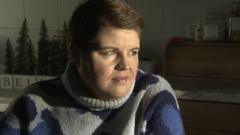With the Irish general election drawing near, many voters find themselves grappling with a disconnect between the nation's reported wealth and their own lived realities. Emma, a mother of four from County Donegal, articulates a shared sentiment among voters: despite being labeled as one of the richest countries in the world, significant challenges persist within essential services like healthcare and housing.
Voters Voice Frustration Amid Ireland's Economic Wealth

Voters Voice Frustration Amid Ireland's Economic Wealth
Despite a booming economy, many Irish voters express discontent over unmet needs in healthcare and housing. As the general election approaches, frustration simmers beneath the surface.
As families and individuals prepare to cast their votes, they emphasize struggles accessing medical care and affordable housing, feeling that the economic advantages have not trickled down to them. Emma's personal experiences underscore systemic issues—her children, especially one with complex medical needs, remain stuck on lengthy waiting lists for crucial treatments.
The sense of frustration is echoed throughout the community, as local journalist Áine Ní Bhreisleáin notes, “We're being told that things are better in Ireland, but people can see the cost of living is rising and rising.” Voters are increasingly concerned about a lack of progress in addressing these pressing concerns, particularly with a staggering 58,000 individuals on the social housing waiting list.
As the election unfolds, the themes of immigration and infrastructure also loom large. County Donegal is witnessing a rising immigrant population that some locals believe is prioritized for resources, amplifying tensions over equality and access to services. Greg Hughes, a local radio host, gestures towards the enduring issues that remain unresolved, remarking that while the government may be striving to improve conditions, the benefits often feel distant for rural constituents.
Amidst the urging for political accountability and accessible public services, voters call for tangible change to ensure their communities are not left feeling forgotten or sidelined in the face of national wealth. As the final votes are tabulated, many will be asking themselves: when will the riches of the country truly reach everyone's pockets?
The sense of frustration is echoed throughout the community, as local journalist Áine Ní Bhreisleáin notes, “We're being told that things are better in Ireland, but people can see the cost of living is rising and rising.” Voters are increasingly concerned about a lack of progress in addressing these pressing concerns, particularly with a staggering 58,000 individuals on the social housing waiting list.
As the election unfolds, the themes of immigration and infrastructure also loom large. County Donegal is witnessing a rising immigrant population that some locals believe is prioritized for resources, amplifying tensions over equality and access to services. Greg Hughes, a local radio host, gestures towards the enduring issues that remain unresolved, remarking that while the government may be striving to improve conditions, the benefits often feel distant for rural constituents.
Amidst the urging for political accountability and accessible public services, voters call for tangible change to ensure their communities are not left feeling forgotten or sidelined in the face of national wealth. As the final votes are tabulated, many will be asking themselves: when will the riches of the country truly reach everyone's pockets?



















